|
Personal information about Henry Godwin
Below is all the information we have about Henry Godwin. As far as we know, the information is correct. However, if you find any errors or have additional information, certificates or pictures, please contact us so that we can update this page. Thank you.
Burial Information
Name on burial register: |
|
Henry Godwin |
|
Burial register image
Click image to enlarge |
|
Age at death: |
|
63 |
Date of burial: |
|
24 June 1874 |
Abode at death:
(according to burial register) |
|
Speen |
Burial register information: |
|
| Book number: |
1868 |
| Page number: |
103 |
| Record number: |
3218 |
|
Official at burial: |
|
The Rev'd. J Leslie Randall, Rector. |
| |
|
|
Source of information: |
|
Burial Register |
| * This entry is awaiting verification. |
Memorial Details
| |
Henry GODWIN |
| |
24 May 1874 |
| |
63 |
| |
Male
|
| |
|
| |
Cross on stepped plinth |
| |
Sandstone |
| |
|
| |
West Facing, on cross: Win God, Win All. West facing, top of pedestal: Henry Godwin/ died June19th. 1874/ aged 63./ "Only longing for that shore/ where the storms of life are o'er." Sunday Chimes/ South facing, top of pedestal: Laura Adele Godwin/ born 26th Feb. 1838/ died 8th Nov. 1868./ "Them also which sleep in Jesus/ will God bring with Him." Thessalonians IV 14./ East facing cross:" Waiting for the coming of our Lord Jesus Christ." East facing top pedestal: Martha Godwin/ born Aug. 20th.1810/ died July 29th. 1905"Thine eyes look unto thee, O Lord God: in Thee is my trust." Ps CXLL.9. East facing, lower pedestal: Martha Spicer/ died 17th October. 1858/ aged 81./ North facing, top pedestal: John Charles Godwin/ born July 9th. 1840/ died Novr. 6th 1898. "My soul fleeth before the Lord/ Before the morning watch. I say/ Before the morning watch. "Ps CXXX6.
|
| |
|
| |
Fair, engraved letters |
| |
WA74 |
| |
|
| |
|
| |
03 September 2012 |
| |
DL |
| |
| Click here for more information on this memorial. |
Other people list on this memorial
|
Laura Adele GODWIN
|
|
Martha GODWIN
|
|
Martha SPICER
|
Obituaries and Newspaper announcements
| Henry Godwin |
|
| Article source: |
|
Newbury Weekly News |
| Date of source: |
|
08 July 1875 |
| Copyright: |
|
© Newbury Weekly News |
|
|
|
HENRY GODWIN
THE LIBRARY OF THE LATE MR. GODWIN.
The antiquarian and topographical library of the late H. Godwin, Esq., F.S.A., will be sold on Thursday, the 13th inst., and two following days, by Messrs. Sotheby, Wilkinson, and Hodge, at 13, Wellington-street, Strand, London, where catalogues may be had.
Newbury Weekly News 8th July 1875 |
|
This obituary entry is awaiting verification.
|
|
|
| |
|
| Henry Godwin |
|
| Article source: |
|
Newbury Weekly News |
| Date of source: |
|
25 June 1874 |
| Copyright: |
|
© Newbury Weekly News |
|
|
|
HENRY GODWIN
THE LATE MR. GODWIN
Our obituary of this week records the death of Mr. Godwin, and we cannot allow the sad event to pass without a few remarks on our late fellow-townsman, who will always hold, in the estimation of those who knew him, so high a place amongst those he loved to think and write of – the “Worthies of Newbury.”
Although not actually born in Newbury, Mr. Godwin had been an inhabitant of it, or rather of its immediate vicinity, from boyhood, and since his settling in it, and closely identified himself with its interests.
Among the schemes and improvements with which he was particularly connected we may mention the “Literary Institution,” of which, in connection with his valued friend and contemporary, Mr. Barnes, he may almost be said to have been the originator: the railway project from Didcot to Andover, of which he was a warm advocate before its importance to the town was generally acknowledged; and the Newbury Cemetery, the chapels of which were the result of a subscription to which he lent all his energy and support, and in which, to the last, he took a personal interest worthy of imitation. He may also be said to have initiated the restoration of the Parish Church, the cost of the east window having been entirely defrayed from his own purse and the contributions of those personal friends he interested in the work.
But if Mr. Godwin’s habits were those of a busy professional man, his tastes and pursuits were those of a man of letters, and, though none of his works have attained to great distinction- a matter which in these days probably rests as much with publisher as author- they are all such as only a good scholar, and we think we might add a good man, could have written: and with regard to two of them we will venture to predict that their reputations will increase: we allude to “Sunday Chimes” and “The English Archaeologist’ Handbook.” Of the former of these we may say that many of its poems, or hymns, will compare favourably with those in more widely known collections, and that one of its greatest merits, the entire absence of controversial allusions, would partly explain the comparatively small number of its readers. The other, and very different, work, the “Handbook,” on additions to which Mr. Godwin was engaged until interrupted by his last illness, has been recognised by the literary journals as a worthy record of the author’s knowledge of the antiquities of his country, and a very valuable and almost indispensable aid to students of history and archaeology.
Mr. Godwin was an accomplished linguist – his library being, indeed, his Elysium – and though possibly the classic authors stood highest in his esteem, he had read in the original, and had annotated and appreciated, the writings of nearly every Continental author, from Petrarch and Cervantes to Goethe and De Stael.
Henry Godwin continued
Of late years he had given considerable attention to the antiquities of Newbury and its neighbourhood, and many of our readers will remember the part he took at the Meeting of the British Archaeological Association in 1859, and in the more recent proceedings of the Field Club.
Of Mr. Godwin’s professional and private life, as it was familiar to a large proportion of our readers we forbear to say more than that as he was always a “lover of good men,” so he was known to, and beloved by, a large and increasing circle of friends and correspondents; few who came in contact with them could resist the influence of his sterling qualities and genial manner.
It is now nearly seven months since Mr. Godwin had the attack which, though seeming at times to loosen its grasp, prepared himself and his family for the end which has come; and we shall not be accused of invading the sacredness of sorrow and bereavement in stating that his last days were in a high degree peaceful, and cheered by the consolation of religion -
“Only longing for that shore,
Where the storms of Time are o’er.”
-a fitting close, indeed, to a life which had been eminently innocent and useful.
The funeral took place on Wednesday afternoon at Newbury Cemetery, and was strictly of a private character, but many of the shops along the streets had shutters up in token of respect to the deceased.
Newbury Weekly News 25 June 1874
|
|
This obituary entry is awaiting verification.
|
|
|
| |
|
| Henry Godwin |
|
| Article source: |
|
Newbury Weekly News and General Advertiser |
| Date of source: |
|
25 March 1875 |
| Copyright: |
|
© Newbury Weekly News |
|
|
|
HENRY GODWIN
MEMORIAL WINDOW.—The painted window, intended as a memorial of the late Henry Godwin, Esq., has been placed in the lower Cemetery Chapel.
The subject is " The Resurrection," which has been treated with great beauty and effect.
Messrs. Heaton, Butler, and Bayne were the artists employed.
Newbury Weekly News and General Advertiser - Thursday 25 March 1875 |
|
This obituary entry is awaiting verification.
|
|
|
| |
|
| Drainage of the Cemetery |
|
| Article source: |
|
Reading Mercury |
| Date of source: |
|
11 August 1855 |
| Copyright: |
|
© |
|
|
|
To the EDITOR of the READING MERCURY.
Speen Hill, August 8th, 1855.
Dear Sir, —As I can have no object in withholding from the public correspondence with Wm. Lee, Esq., of the General Board of Health; more especially when it has been so freely commented upon, I enclose a copy of my letter, simply requesting that you will expunge that portion of it which details the ill consequences of want of drainage—that portion being more meet for the eye of sanitary commissioner than for that of the public.
[Copy of letter to W. Lee. Esq.]
Newbury, 28th July, 1855.
Sir, —As Secretary to the Newburv Cemetery Company, I shall be greatly obliged if you will call the attention of the General Board of Health to the subject of the want of drainage of the Newbury Cemetery. This cemetery is constructed on gravelly soil, beneath which, at depth of 6 or 7 feet, is a substratum of clay; the consequence is that rain percolates through the gravel, but cannot permeate the clay. (Here follow details, showing the imperative necessity of draining the cemetery.) All that is required to remedy this evil is drainage, and this remedy as practicable as it is simple and efficacious.
The site of the cemetery is higher, considerably, than the level of the town, and competent persons who have examined the ground, report that, a main pipe carried right through the cemetery, north and south, at a depth of 7 feet, with branch lateral pipes running into it, would suffice to drain it effectually.
Why, then, you naturally exclaim, is it not done? To this I reply, because the Cemetery Company have neither the means nor the power. Although the operations of the company have been conducted on the most parsimonious scale, the returns do but just pay current expenses, and no dividend has ever yet been declared, so that they have not the means; and they have not the power, because they cannot provide an outlet for the drainage; being bounded in on every side, and having no right to invade the property of others.
Under these circumstances appealed to the Local Board of Health, who appointed a committee of inquiry, and I attended the committee so appointed with a witness well able to depose to the above facts; but convinced did the committee appear of the necessity of drainage, that they did not require any evidence, but reported unanimously —that it is expedient that culvert should be laid down as far as the cemetery. Here I thought my task was done; for, poor as are the resources of the company, I did not despair of its raising sufficient fund to drain the soil within their own boundaries, if the public would contribute their share, and provide a proper outlet.
What, then, was my surprise, to be informed, (for I have not the honour to belong to our Local Board), that on the presentation of the report, a member of that committee— one who had been present, and joined in its unanimous vote— moved that the report, which related to other matters, should be received, except that part which related to the drainage of the Cemetery!
This stultifying resolution was carried by the majority of the members of the Local Board of Health, and it was in vain that I protested against its breach of public faith. I am, therefore, driven to " Fly from petty tyrants to the throne;" and I earnestly solicit your representation of the case to the General Board of Health, and to urge that Board order that an efficient drainage of the town, and more particularly of the Cemetery, shall be immediately carried into effect under the immediate supervision of the General Board, and also to prohibit any further burials in the town of Newbury, elsewhere than in the Cemetery, unless in vaults or brick graves.
I am, &c. &c,
HENRY GODWIN.
To this letter, the General Board of Health, with very commendable promptness, replied that the proper tribunal of appeal with regard to closing graveyards was the Home Office: and that with regard to the drainage of the Cemetery, although it would appear to be work of which the expenses should be borne by the Cemetery Company, yet doubtless it might be effected at a special district rate, distributing the charge over years. I will only add that this very simple and kind suggestion, showing that the Local Board had the power, if it had the inclination, to relieve the proprietors of the Cemetery from the immediate pressure of the expense, has been sapiently construed into throwing the expense of the proposed public culvert upon the cemetery company—a construction which, of course, was disclaimed, as soon as communicated, by the General Board of Health.
I am, Sir, your faithful servant,
HENRY GODWIN
\Reading Mercury - Saturday 11 August 1855 |
|
This obituary entry is awaiting verification.
|
|
|
| |
|
| HENRY GODWIN |
|
| Article source: |
|
FNRC |
| Date of source: |
|
|
| Copyright: |
|
© |
|
|
|
HENRY GODWIN
At the death of Henry Godwin on June 19th 1874, at his residence The Lawn on Speen Hill, Newbury lost an eminent and valuable citizen.
Mr. Godwin was born in 1811 in Bath, though his antecedents were of Wiltshire stock. He began practising as a solicitor in 1833 in Southampton, but in 1837 he moved to and settled in Newbury, having offices in the Market Place and later Northbrook Street. His worth was recognised when he was appointed Clerk to the Magistrates. Though by profession a solicitor, Mr Godwin's private interests were literary and historical and as early as 1841 he became a Fellow of the Society of Antiquaries. Early in his career he wrote a three volume historical novel entitled "Stonehenge, or the Romans in Britain." Also two volumes of poetry, which his contemporaries did not judge to be of high value, but were interesting; one contained hymns and the second recorded some religious thoughts, including some which had been translated from Greek and German. In fact Mr. Godwin was fluent in several languages and as well as the ones previously stated, he read Spanish and French. Other works from his hand were the second volume of Transactions of the Newbury Field Club containing works on Donnington Castle and the History of Welford. His "The Worthies of Newbury" was read to the British Archaeological Association when it met at Newbury in 1859.
His interest in history and Newbury involved in his becoming a founder member the Newbury Field Club and a Vice President of the Literary Institution for many years. The parish church benefited greatly from his interest when it need of extensive restoration. In particular the east window received his financial interest.
Mr Godwin was a great supporter of the plans to create a cemetery to relieve the overused church graveyards, which were causing health hazards in the centre of town. A site on Newtown road was identified and decided upon. Mr Godwin was a keen supporter of the two chapels — one for members of the Church of England and the other for Non-conformists. He died in 1874 after a seven month illness and he was buried in the cemetery in a grave opposite the door of the Church of England chapel. His family proposed and financed the stained glass window there in his memory.
He married Martha (maiden name probably Burke) of Bray around 1835 before coming to Newbury. A family soon began to arrive; Henry Burke Godwin in 1836, Laura Adele in 1838, John Charles in 1840, Charlotte Ellen in 1842 and Caroline Elizabeth in 1846.
Besides Mr Godwin being buried in the cemetery, his wife joined him in the family vault in 1905, where his daughter Laura Adele had been buried in 1868 and his son John Charles in 1898. |
|
This obituary entry is awaiting verification.
|
|
|
| |
|
Pictures and photographs
.jpg)
Godwin Family Tree
Godwin Family Tree
|
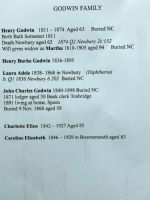
Godwin Family
Godwin Family
|
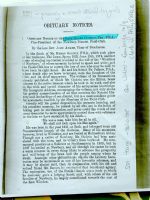
Godwin Obit Field Club Page 1
Godwin Obit Field Club Page 1
|
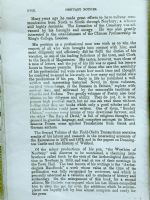
Godwin Obit Field Club Page 2
Godwin Obit Field Club Page 2
|
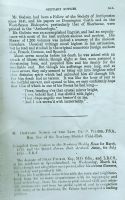
Godwin Obit Field Club Page 3
Godwin Obit Field Club Page 3
|
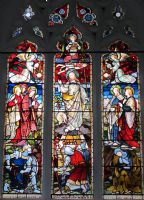
Godwins window - Cemetery Chapel
Godwins window - Cemetery Chapel
|
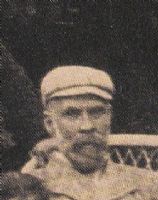
Robert Turnhill Bayne (of Heaton Butler and Bayne) Makers of window
Robert Turnhill Bayne (of Heaton Butler and Bayne) Makers of window
|
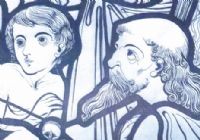
Work by Blayne in Denton Norfolk
Work by Blayne in Denton Norfolk
|
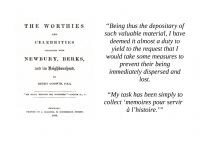
Worthies of Newbury
Worthies of Newbury
|
Biographies & History
Other Resources
This person has featured in dramas performed by the Friends. Details below.
In The Beginning
First performed: 26/05/2011
Author: Ros Clow
“In the beginning…” was our first production in 2011, in the Town Hall. In a one hour re-enactment, using the notes taken during the Parliamentary Enquiry in 1847, we presented the lighter aspects of the enquiry as evidence of the need for a new cemetery was presented to a parliamentary commissioner, G H Whalley. The venue has tight fire regulations resulting in some Friends not being allowed in. They were not happy! So we were asked to put the production on again during Heritage Weekend in September – two more performances were well attended.
© FNRC
Related Links
*The FNRC believe that the certificates published on this page have been added in compliance with the rules laid down by the General Register Office (GRO).Click here for more information.
If you believe that we may have inadvertently breached the privacy of a living person by publishing any document, pleasecontact usso we can immediately remove the certificate and investigate further.
Thank you
FNRC.
|
Website designed and maintained by Paul Thompson on behalf of the Friends of Newtown Road Cemetery.

Administrator Login
|
|


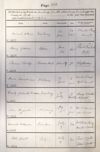
.jpg)







.jpg)
